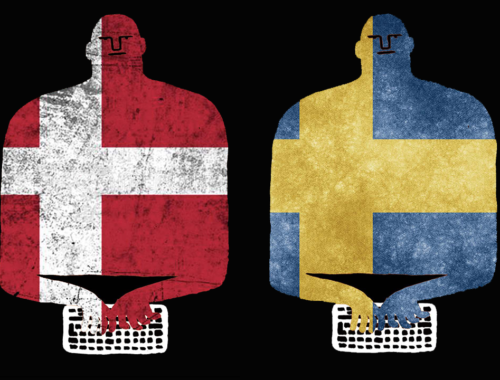He was a highly-educated specialist from Southern Europe, and my assignment was to help him adjust to the business culture in his new role at a large Danish company.
We’d been working together for awhile when I noticed he still hadn’t updated his LinkedIn. According to his profile, he was still in another part of Europe working for a different company entirely.
I asked him – does this mean you don’t like your new job?
He said, no, I like it at lot. But maybe in a year or two I’ll want to work someplace else, and I don’t want my LinkedIn to look flaky, like I’m job hopping.
I told him, job hopping is not a problem in Denmark, which has one of the highest job mobility rates in the OECD. Up to 20% of Danes will have a new job this year.
Danes change jobs more than people elsewhere in Europe
And that’s not just young workers. People in the prime of their careers change jobs at a higher rate in Denmark than they do elsewhere in Europe, and even for people over 55, job mobility is high.
As a matter of fact, if you don’t change jobs regularly in Denmark, or at a minimum change jobs within a company if you’re there for a few years, people might wonder why.
(I talk about this in the audio version of my book How to Work in Denmark, which is now available on Amazon Audible, Saxo, Apple Books, and other fine outlets.)
“Flexicurity” – easy to hire and fire
Frequent job changes are a reflection of the Danish concept of flexicurity – flexibility with the security of the welfare state. The logic is that it’s easy to hire people and easy to fire them, much easier than it is in many other European countries, including Sweden. There’s no lifetime employment in Denmark.
Sometimes it’s your decision to change jobs. Sometimes it’s your employers’ decision that it is time for you to change jobs.
But neither is considered embarrassing or shameful. Being let go is not a career-killer in Denmark.
The soft pillow of the Danish welfare state
Internationals in Denmark don’t always know this.
I had a French acquaintance who was a manger in Denmark, and he was told by his higher-ups that he had to let go of 5 people on his team. He was so upset. He couldn’t sleep the night before, his stomach hurt. He had to tell these poor people they’d lost their jobs.
When the time came and he delivered the bad news, the room was silent for a moment. The workers certainly weren’t pleased.
But suddenly, they pepped up. “Well, I’ll finally have time to finish construction on my garden,” one said. “I’m going to visit my grandchildren in Australia!” said another.
These people had the soft pillow of the Danish welfare system to land on.
Less fear because of tax-sponsored services
First of all, they had at least three months’ fully paid salary ahead of them, up to six if they had worked at the company for a longer period. After that they’d have up to two years of government income support, plus free retraining if they wanted it.
Of course, they had paid for this themselves, in advance, with their giant Danish taxes and their union fees, but knowing that soft pillow was there gave them an entirely different attitude towards their upcoming unemployment. They weren’t afraid, as you often are in a country with fewer of these tax-paid services.
Things are a little different if you’re here in Denmark on a working visa. In that case, losing your job could mean you have only a few months to find a new one before you have to return home. It also makes job switching a little more complex, because your new employer will have to take over your visa.
But once you achieve permanent residency in Denmark, you too can hop on the merry-go-round of Danish job switching.
Keep your training up to date
Because your employer can let go of you at almost any time – there are a few restrictions, but not many – it’s your job as a Danish employee to keep on your toes. You have to keep your training up to date, constantly be learning new things in your field, and keep your LinkedIn fresh.
And if you want to look for a new job, you can. You don’t have to tell your current employer you’re looking.
You can take your pension with you
Don’t worry about your pension – you can take your pension with you if you’re going from private company to private company. It’s a little different if you’re going from a government job to private industry, but bottom line, you will not lose your pension savings if you change jobs.
If you find something new, your contract or the union contract will usually require you to give one to three months’ notice to your current employer before you move on, although sometimes the company will ask you to leave right away.
That happens a lot if you’re dealing with confidential information, or you’re going to a competitor. They just want you out of the office.
But you still get paid for the notice period.
Transparency in Denmark
Job switching is generally done with the usual Danish transparency. There’s not a lot of skullduggery, and that includes cases when it goes wrong.
I’ve seen numerous people write on LinkedIn that they joined company X a few months, and it was quickly clear that it was not a good fit, so they are now happy to announce their new position at Company Y – or that they’re now open to opportunities, do you know any?
This kind of honesty makes you more likable in Denmark.




